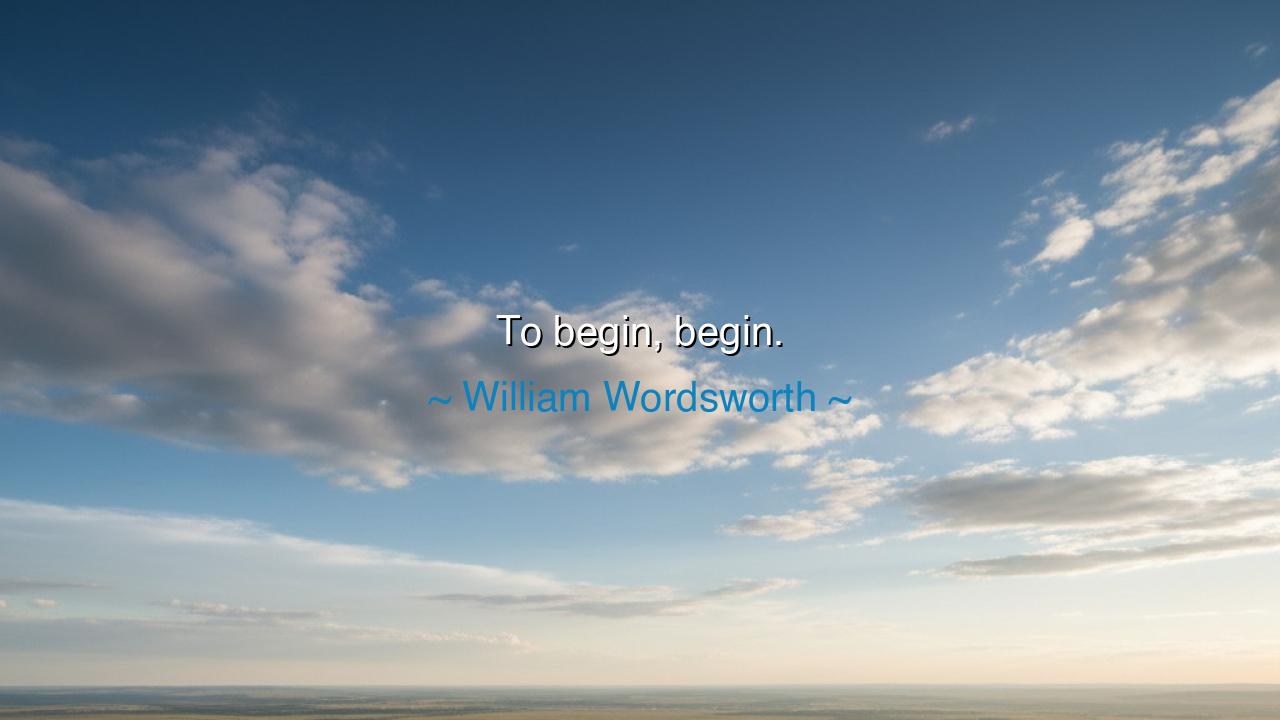
To begin, begin.






Hear, O seeker of action, the timeless words of William Wordsworth, poet of nature and prophet of simplicity: “To begin, begin.” In this brief utterance lies a power greater than volumes of advice, for it pierces through hesitation and lays bare the heart of progress. How many dreams have perished not for lack of vision, but for lack of a first step? How many souls stand at the edge of greatness, gazing endlessly, yet never moving forward? Wordsworth’s cry is both command and cure: if you would start, then start.
To begin is to cross the threshold from thought into reality. The mind may wander, plan, or hope, but until the hand moves, nothing is born. Wordsworth, who walked the hills of the Lake District and saw the majesty of rivers and mountains, knew that even the grandest journey begins with the lifting of a single foot. He spoke not only to poets, but to all who linger in delay: the artist staring at the blank canvas, the student staring at the unopened book, the leader staring at the untried path. His wisdom is simple—if you would have the work done, begin it.
The ancients themselves bore witness to this truth. Julius Caesar, standing upon the banks of the Rubicon, faced a moment of hesitation. Before him lay civil war, uncertainty, and peril. He could have lingered in endless thought, weighing every risk. But instead he stepped forward, uttering, “The die is cast.” In that step, Rome’s history was transformed. He began—and in beginning, he unleashed destiny.
So too in the world of invention and creation. Consider Leonardo da Vinci, who conceived wonders in his notebooks. Many of his ideas never left the page, yet those he began—his sketches of flying machines, his paintings of immortal beauty—became eternal. What was the difference between dream and masterpiece? Only this: the act of beginning. To dip the brush in paint, to put pen to paper, to shape the first line—this is the birth of creation.
The meaning is clear: delay is the thief of life. Fear whispers, “Wait for a better time.” Perfection demands, “Wait until you are ready.” But the truth is that readiness comes not before, but after the beginning. The river does not reveal its full course until you step into it. The path does not show its end until you walk upon it. To begin, begin—for no other secret exists.
O listener, do not despise small beginnings. The first stroke of the brush, the first word of the poem, the first stride of the march—these are humble, but they contain within them the seed of greatness. Do not be paralyzed by the vastness of the task, for mountains are climbed step by step, and nations are built brick by brick. The only failure is never to begin at all.
Therefore, take this counsel as a commandment for your own life: when you feel the weight of hesitation, act. When you long for change, begin. Do not wait for the perfect hour, for the hour is already here. Do not wait for courage, for courage awakens in the doing. Begin, and you will find strength where once there was weakness, and clarity where once there was doubt.
Thus the teaching of Wordsworth endures: “To begin, begin.” It is the cry that cuts through fear, the spark that ignites all progress, the first step that leads to every victory. Begin, and the world will open before you; begin, and your dream will take form; begin, and you will live not as a dreamer of what might have been, but as a doer of what was accomplished.






AAdministratorAdministrator
Welcome, honored guests. Please leave a comment, we will respond soon